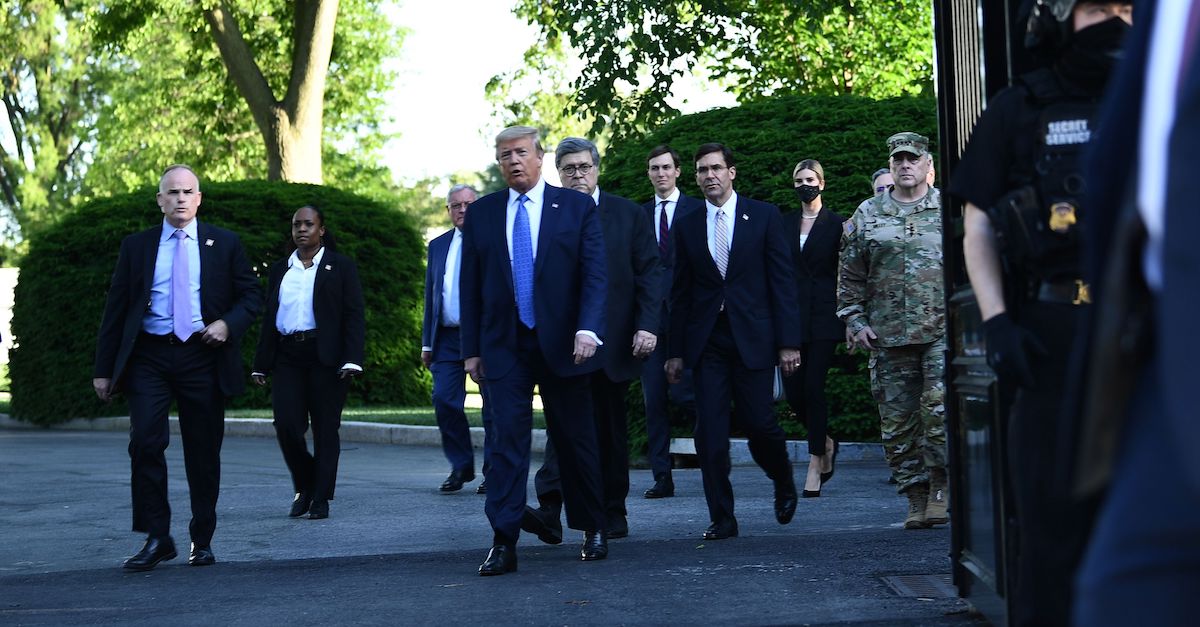
US President Donald Trump leaves the White House on foot to go to St John’s Episcopal church across Lafayette Park in Washington, D.C. on June 1, 2020.
A former senior analyst with the Defense Intelligence Agency wrote in Just Security on Thursday that he resigned from his post after witnessing firsthand the events that took place in Lafayette Square on June 1. Kyle Murphy said he does not believe that Defense Secretary Mark Esper and Chairman of the Joint Chiefs of Staff Mark Milley can be trusted to “refuse unlawful orders” from President Donald Trump.
In the aftermath of the Minneapolis Police killing of George Floyd, protesters gathered by the thousands in Lafayette Square. Murphy said that he was one the “peaceful Black Lives Matter protesters” who were “tear-gassed in Lafayette Square and nearly knocked to the ground by the downdraft from a military helicopter hovering over Pennsylvania Avenue.”
After a speech at the Rose Garden during which President Trump threatened to invoke the Insurrection Act of 1807 to quell rioting and looting, military police and mounted police were mobilized in Washington, D.C. and used tear gas to clear out protestors who had gathered en masse outside of the White House in Lafayette Square. After the Rose Garden speech, the president made his way across Lafayette Park—flanked by an entourage that included Esper and Milley. The latter was wearing fatigues.
Moments later, Trump administration officials and advisors looked on as the president held up a Bible in front of St. John’s Episcopal Church, which had been set on fire by rioters the night before. After much criticism that the Chairman of the Joint Chiefs of Staff—”the senior ranking member of the Armed Forces“—had participated in a political statement, Milley apologized for his role in the photo op.
The controversy surrounding the clearing out of Lafayette Square has not gone away. Kyle Murphy said that this, as well as the federal response in Portland and elsewhere in the U.S., looked like tactics used by “autocratic leaders around the world.”
“In the course of my work, I have watched autocratic leaders around the world employ similar tactics, actions that often precede broader uses of violence against domestic opposition, ” he wrote. “Unidentified federal forces in cities across the United States committing abuses against demonstrators is an evolution in the Trump administration’s authoritarian approach to dissent, not an anomaly.”
Murphy said that his decade-plus as a government employee came to an end because he didn’t trust that military leaders would carry out their duties with a conscience:
I left government service after more than a decade because I lost faith in the courage of the Secretary of Defense and the Chairman of the Joint Chiefs of Staff to refuse unlawful orders from the President. They effectively labeled me and other Americans expressing our views in a peaceful assembly as enemies. They authorized troops to use overwhelming force and set a dangerous precedent by enabling the president to ignore state and local officials’ objections and deploy federal forces in response to popular protests. While the military is, thankfully, out of the spotlight for now, the president has turned to other eager allies — in the Department of Homeland Security and the Department of Justice — who believe their components of the federal government can clamp down on dissent with a veneer of legality.
He wrote that he was “alarmed” that “[e]ach day, Trump’s approach looks more like the autocrats I warned about” when working as a career intel analyst in government, calling this a “continuous slide toward authoritarianism.”
[Image via BRENDAN SMIALOWSKI/AFP via Getty Images]
Have a tip we should know? [email protected]